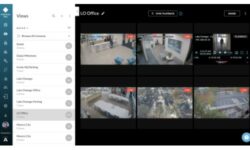How to Plug Into the Power of Vertical Niche Marketing
Focusing on vertical markets enable you to develop specific markets which, in turn, enable you to develop partnerships and credibility within the installing security contractor community.

There are many vertical markets and in-line B2Bs that you can connect with to effectively expand your reach into niche areas of your local market.
Looking for easy money? I’m not sure the security business is the place to find it. But I can tell you where to find some serious cash if you’re willing to work hard to develop it.
This is money that you probably wouldn’t have if you decided not to develop partnerships with businesses that work in certain vertical niche-oriented verticals.
Focusing on vertical markets enables you to develop specific markets which, in turn, enable you to develop an enormous amount of credibility in our immediate community. To get started, begin by identifying possible niche markets that you can work in. Here are a few verticals, a couple of which we’ll discuss in this blog article:
- Nursing homes (nurse call, emergency call, fire alarm, CCTV, patient wandering)
- Grocery stores (CCTV, temperature detection, fire alarm, intercoms, access control)
- Multitenant office buildings (multisuite intercoms, CCTV, fire alarm, access control)
- Multifamily apartments (multisuite intercoms, CCTV, fire alarm, access control)
- Warehousing (access control, alarm systems, fire alarms, CCTV)
- Restaurants (fire alarms, CCTV, intrusion alarm, intercom systems)
In this blog post we’ll discuss how to identify and develop business partnerships in order to develop new and usually friendly and loyal clients.
Horizontal Vs. Vertical Thinking
In the 1970s and 1980s, while most of the security companies in my local market sought to find exclusive, specific security-related sales opportunities across a wide expanse of business types, I made the decision to diversify into other venues.

Andy Gordon, a tele-data tech, replaces a legacy emergency call system with a new model at a nursing home in Canton, Ohio.
This enabled me to expand my market reach and thus my overall profit base. Where my local competitors saw business in a horizontal manner, I adopted a vertical, multi-dimensional view.
So what’s the difference between horizontal and vertical thinking?
“A horizontal market differs from a vertical market in that it is not industry-specific. Vendors in a horizontal market sell their products or services to customers in a number of different industries.” (bowden2bowden blog)
Where horizontal marketing often involves cold calling and digging to find sales leads, vertical marketing looks top down in an effort to foster relationships (aka: partnerships) with businesses that currently operate in the verticals you’re selected to access, such as those listed in the introduction. When you develop a partnership with these folks, you may also gain access to the clients they serve through first-level referrals and, ultimately, from credible sources.
At the heart of this process is the development of B2B marketing where you target those businesses that already work with potentially hundreds if not thousands of the very buyers that you’re looking for. In this or any other business, approaching new, potential clients with a personal reference as opposed to cold calling is key to effective B2B/B2C (business-to-consumer) selling.
“When creating a marketing campaign, employing a mix of both vertical marketing and horizontal marketing will best serve your organization. Utilizing both marketing systems will reach a wider range of customers and generate more profits.” (bowden2bowden blog).
Looking for B2B Opportunities
For a moment let’s look at the multitenant apartment/office market. What kinds of electronic-based systems are there within this specific vertical market that a security firm like your own would be interested in installing and servicing? Several immediately come to mind: 1) multitenant intercoms (video and audio/video), 2) access control, 3) fire alarm, and 4) CCTV.

This new emergency call system includes light test buttons (bottom) as well as numbered light buttons that coincide with room numbers.
Who could you partner with that works B2B/B2C in these specific markets? Two B2B’s immediately come to mind: 1) local electrical equipment distributors (EDs), and 2) electrical contractors (ECs).
EDs are known to handle multitenant intercom systems and, in some cases, access control — both of which are sometimes combined in a single equipment offering. Through this channel, you often can derive the names of local ECs who actually buy and install these products in multitenant applications.
You also can obtain the names of ECs that do this kind of work from your local builders exchange. In turn, ECs are often the primary point of contact when it comes to installing this gear in an actual application. This is because this and other low-voltage systems are bundled into a much larger body of work.
As a security company, you can provide aftermarket services which EC’s do not especially want to do (for whatever reason). In return, you have your own clients who might one day require an ECs services. Remember that a relationship of this kind must be mutually beneficial to all parties, so be prepared to offer leads and/or technical assistance where and when possible.
How to Approach Partnering
Because it’s local, begin by sending partner prospects a business card and a brochure that outline your low-voltage services. Send via the U.S. Postal Service as well as general email. Follow-up with a visit to the prospective partner’s office or shop, but first call ahead to set a day and time for an eye-to-eye meeting.

A power supply and flash module in a metal can as part of the new emergency call system.
Propose a subcontractor relationship where your firm agrees to service any low-voltage systems and products that the EC installs, has ever installed, and in their name if necessary. In addition, offer to upsell the ECs existing clients now and in the future as necessary. Most of the ECs you encounter will tell you to move forward on your own.
Because your firm can install additional types of security in this venue, your salesperson should provide information and brochures on these additional offerings as well. Offer to sell them under the proposed partner’s company name, or offer them a finder’s fee if they allow you to sell under your own.
In most cases they’ll take the latter because they do not wish to be responsible for products and systems they don’t work with on a regular basis. In many cases, in fact, they’ll tell you to do it without even a finder’s fee.
Cracking the Nursing Home Egg
Nursing homes are another area where ECs often get the call first before anyone else. In this venue they often find themselves looking for subcontractors who can install and service nurse call and emergency call systems.
Fire alarm systems may or may not fall under the ECs care, but one thing is for sure, once you have your toe in the door of a nursing home, it won’t take long to acquaint the facility administrator and superintendent of grounds with all the other products and services that your firm offers, such as CCTV, access control, fire alarm and patient wandering systems.
Local fire protection companies that provide fire extinguishers and sprinkler system services also are a great point of entry into local nursing homes and assisted living facilities. Most of these firms do not have techs who are qualified or licensed to install and service fire alarm equipment, but they often are given an opportunity to bid on them.
Before you enter the fire alarm side of the nursing home vertical, however, you need to have a fairly sound knowledge of fire code, for starters NFPA 70, 72 and 101. You’ll be asked to advise not only the fire protection company or EC in matters of importance pertaining to fire code, but also by the nursing home itself.
Most states also have a licensing program that you’ll have to comply with. Be aware of all the requirements before offering this service.
In closing, there are many vertical markets and in-line B2Bs that you can connect with that will effectively expand your reach into niche areas of your local market. Be inventive and look for multiple connecting points involving companies that have a ready-made market or access to one. Then do what you do best — sell yourself and your services to them. Many times this will enable you to gain access to their clients in the process.
It’s clearly a win-win for all concerned.
If you enjoyed this article and want to receive more valuable industry content like this, click here to sign up for our FREE digital newsletters!

Security Is Our Business, Too
For professionals who recommend, buy and install all types of electronic security equipment, a free subscription to Commercial Integrator + Security Sales & Integration is like having a consultant on call. You’ll find an ideal balance of technology and business coverage, with installation tips and techniques for products and updates on how to add to your bottom line.
A FREE subscription to the top resource for security and integration industry will prove to be invaluable.








